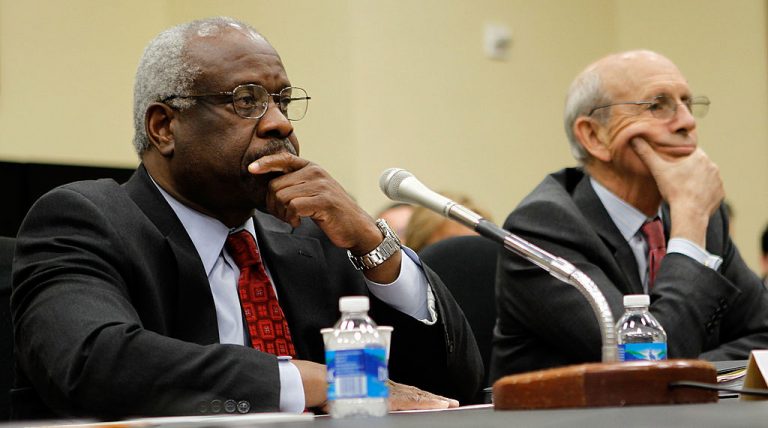Supreme Court Justice Clarence Thomas has suggested that social media platforms cannot censor constitutionally protected speech. He made the observation in the context of a case that involved former President Donald Trump.
While in office, Trump had blocked some critics on his Twitter page. The critics approached the high court, claiming that their First Amendment was violated as the President’s Twitter page is a public forum. Since Trump is now out of office, the high court decided that the case is moot. Thomas concurred with the high court decision in a 12-page submission in which he also highlighted his concerns regarding the power wielded by social media companies.
“Today’s digital platforms provide avenues for historically unprecedented amounts of speech, including speech by government actors. Also unprecedented, however, is control of so much speech in the hands of a few private parties… We will soon have no choice but to address how our legal doctrines apply to highly concentrated, privately owned information infrastructure such as digital platforms,” Thomas wrote.
The Supreme Court justice noted that companies like Twitter and Facebook are sufficiently similar to common carriers or places of accommodation that they can be subjected to regulation. He mentioned the owners of Facebook and Google, stating that while these companies are public, just three people control these two companies, which essentially makes them personal fiefdoms that enjoy massive power.
While agreeing that Trump’s Twitter account does resemble a “constitutionally protected public forum” in certain respects, Thompson stressed the fact that the issue pales in comparison to Twitter’s absolute authority to remove any account at any time for any or no reason.

Success
You are now signed up for our newsletter
Success
Check your email to complete sign up
Some have argued that platforms like Facebook and Twitter are not the only social media companies on the internet, and that if anyone finds their terms of use or policies problematic they can always shift to alternatives. Thomas dismissed this argument, pointing out that it is akin to suggesting that a person can always avoid the toll bridge by swimming across the river.
He said that when assessing whether a company holds significant market power, it is necessary to check whether the alternatives also have comparable market power. In the case of digital platforms, Thomas says that no such alternative options exist.
In his submission, Justice Thomas referenced the work of Adam Candeub several times. Candeub is a law professor and an expert on free speech and antitrust issues. He has a history of working on free speech cases against Twitter and was also appointed as a senior official in the Trump administration, where he was tasked with proposing the necessary changes to Section 230. It is this law that social media companies utilize to censor users without incurring liabilities. In an interview with Breitbart, Candeub welcomed Thomas’s stand on the issue.
“Justice Thomas’s statement is an encouraging sign that the federal judiciary–as well as legislatures–will look carefully at the legal status of social media… Never in our history has our country handed over to private firms control over dominant communications networks without requiring obligations to serve all citizens,” Candeub said in the interview.
According to a poll published last month, Clarence Thomas is the most popular justice on the Supreme Court of the United States among Republican Party supporters. He scored 59 percent favorability with the party, closely followed by justices Amy Coney Barrett and Brett Kavanaugh, who both scored more than 50 percent.
Follow us on Twitter or subscribe to our email list
















